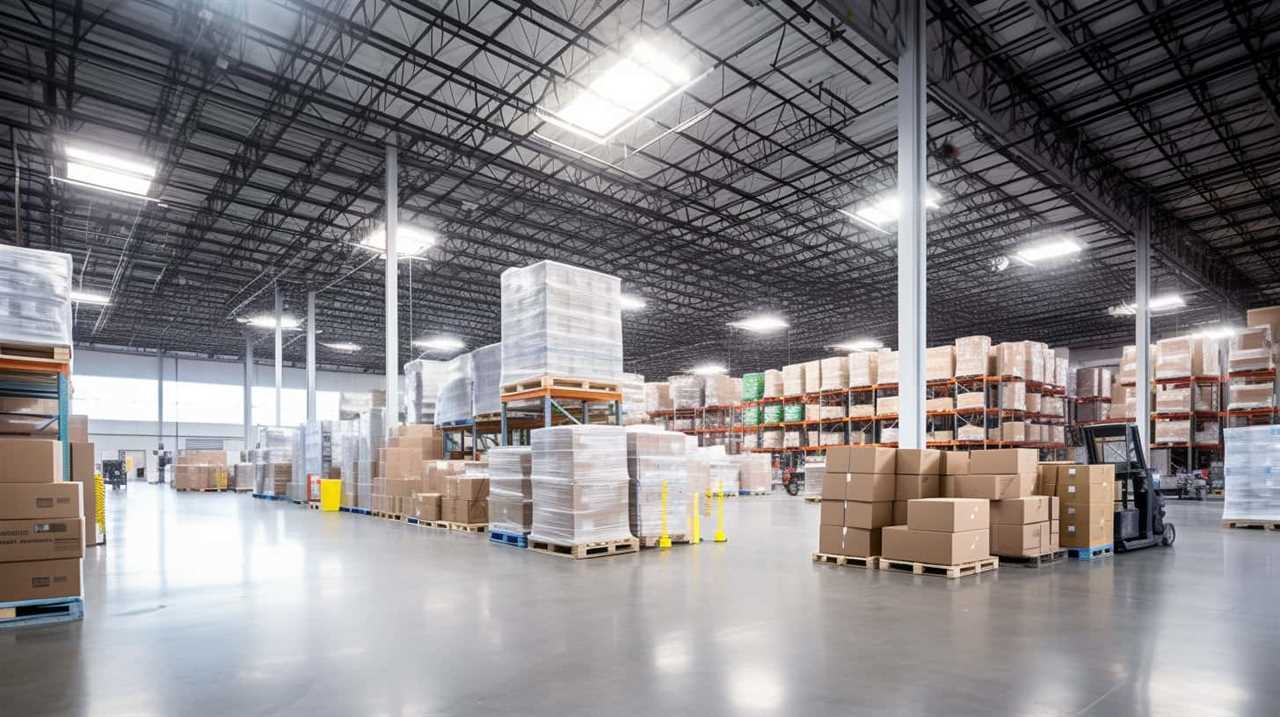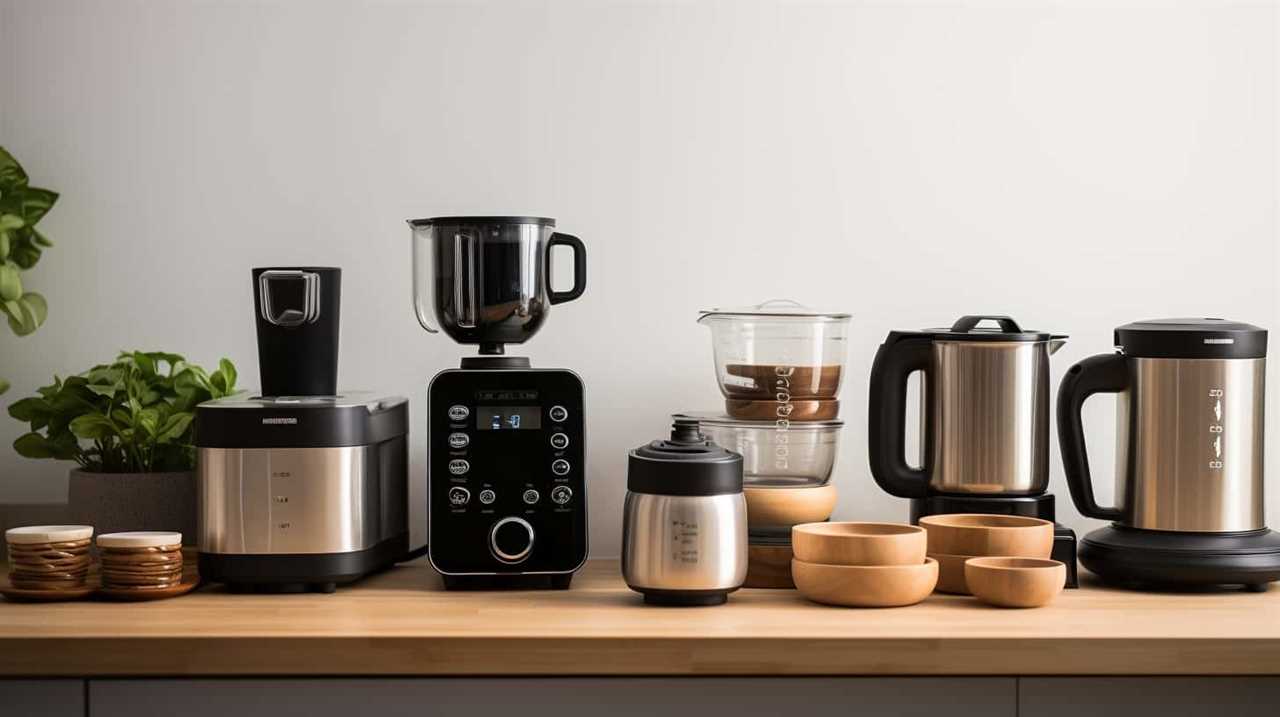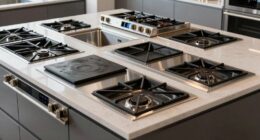Did you realize that certain appliances in our homes can greatly affect our gas consumption?
In this article, we will explore the appliances that consume the most gas and how they affect our monthly bills.
From water heaters and furnaces to stoves and ovens, we’ll provide data-driven insights to help you make informed decisions about your energy usage.
So, if you desire mastery over your gas consumption, keep reading to discover which appliances you should pay close attention to.

Key Takeaways
- Water heaters and furnaces have high gas consumption among household appliances.
- Regular maintenance and upgrading to energy-efficient models can significantly reduce gas usage in water heaters and furnaces.
- Stoves, ovens, and dryers also consume a significant amount of gas, and regular maintenance and choosing efficient models can help save energy and reduce gas bills.
- Gas fireplaces can provide efficient heating with less fuel consumption compared to traditional fireplaces, and transitioning to alternative heating options can minimize environmental impact.
Water Heaters
Our water heater’s gas consumption is one of the highest among household appliances. To reduce gas usage and save money, it’s essential to consider energy-efficient water heaters and regular water heater maintenance.
Energy-efficient water heaters utilize advanced technology to minimize gas consumption while providing hot water efficiently. These models are designed with insulation and improved heat transfer mechanisms, resulting in reduced heat loss and lower gas usage.
Additionally, proper water heater maintenance ensures optimal performance and gas efficiency. Regularly flushing the tank, inspecting and replacing faulty parts, and adjusting the thermostat can improve the gas consumption of a water heater.
Furnaces
When it comes to furnaces, there are several high-efficiency options available that can significantly reduce gas usage.

It’s important to compare gas usage among different furnace models to determine which one is the most energy-saving.
High-Efficiency Furnace Options
We have identified three high-efficiency furnace options that consume the most gas. Upgrading your furnace to a high-efficiency model can provide significant benefits, such as reduced energy consumption and lower utility bills. These furnaces are designed to convert a higher percentage of fuel into heat, resulting in improved efficiency and performance. Here are three popular high-efficiency furnace options:
| Furnace Model | Annual Fuel Utilization Efficiency (AFUE) | Gas Consumption |
|---|---|---|
| Model A | 95% | 100,000 BTU |
| Model B | 97% | 90,000 BTU |
| Model C | 98% | 80,000 BTU |
As shown in the table, each model offers a higher AFUE, indicating better fuel efficiency. Choosing a high-efficiency furnace during installation can help you maximize energy savings and reduce your carbon footprint.
Gas Usage Comparison
Continuing the discussion on high-efficiency furnace options, let’s compare the gas usage of different models. When it comes to gas usage in commercial buildings, it’s crucial to consider the energy efficiency of the furnace. Here are some key points to keep in mind:
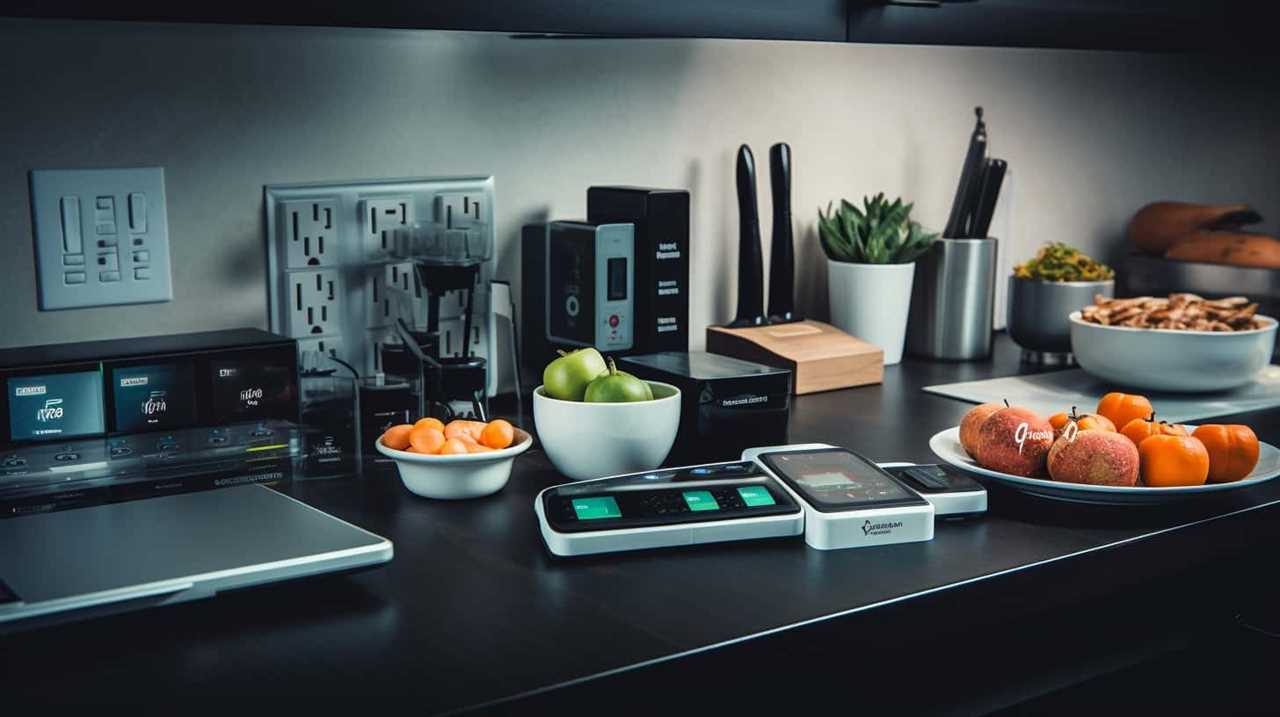
- Energy Star certified furnaces can save up to 15% on energy bills compared to standard models.
- Variable-speed furnaces adjust the heat output to meet the demand, resulting in reduced gas usage.
- Modulating furnaces offer precise temperature control, minimizing gas wastage.
- Condensing furnaces recover heat from exhaust gases, making them highly efficient.
Additionally, it’s worth noting the impact of gas usage in transportation. Efficient furnaces not only reduce energy consumption but also contribute to lower greenhouse gas emissions, making them environmentally friendly choices.
Energy-Saving Furnace Models
To maximize gas usage efficiency, we can explore energy-saving furnace models.
Upgrading to energy efficient furnace options can provide numerous benefits. These models are designed to consume less gas while still providing the necessary heat for your home. By choosing an energy efficient furnace, you can reduce your energy consumption and save money on your utility bills.
These furnaces often have advanced features such as variable-speed blowers and modulating gas valves, which allow for more precise control over the heating process. Additionally, energy efficient furnaces are often quieter and produce fewer emissions, contributing to a healthier environment.

Investing in an energy-saving furnace model can lead to long-term savings and a more comfortable and sustainable home.
Stoves and Ovens
Stoves and ovens consume a significant amount of gas in most households. Proper stove maintenance and gas stove safety are crucial to ensure efficient and safe operation. Here are some important points to consider:
- Regular cleaning: Clean the stove burners and oven regularly to remove grease and food debris, as they can hinder proper gas flow and cause uneven heating.
- Proper ventilation: Ensure that your kitchen has adequate ventilation to prevent the accumulation of gas fumes and reduce the risk of carbon monoxide poisoning.
- Check for gas leaks: Regularly inspect the gas connections and fittings for any leaks. Use a mixture of soap and water to test for bubbles, indicating a leak.
- Use cookware with flat bottoms: Flat-bottomed pots and pans ensure optimal heat transfer and prevent gas wastage.
Dryers
Dryers also consume a significant amount of gas in most households, making proper maintenance and safety measures essential for efficient and safe operation. To understand the gas consumption in dryers, let’s take a look at the table below:
| Dryer Model | Gas Consumption (BTU/Hour) |
|---|---|
| Model A | 20,000 |
| Model B | 25,000 |
| Model C | 30,000 |
| Model D | 35,000 |
| Model E | 40,000 |
As we can see, dryer efficiency can vary greatly depending on the model. By choosing a more efficient dryer, with a lower gas consumption, you can save energy and reduce your gas bill. Additionally, regular maintenance, such as cleaning the lint trap and checking the venting system, can ensure optimal performance and prevent fire hazards. Now, let’s move on to the next topic: fireplaces.

Fireplaces
When it comes to gas fireplaces, it’s important to consider their efficiency, environmental impact, and operating costs.
Gas fireplaces can vary in terms of efficiency, with some models offering higher energy efficiency ratings than others.
Additionally, it’s crucial to be aware of the environmental impact of using gas fireplaces, as they contribute to greenhouse gas emissions.
Lastly, operating a gas fireplace can result in significant costs, depending on factors such as fuel prices and usage patterns.
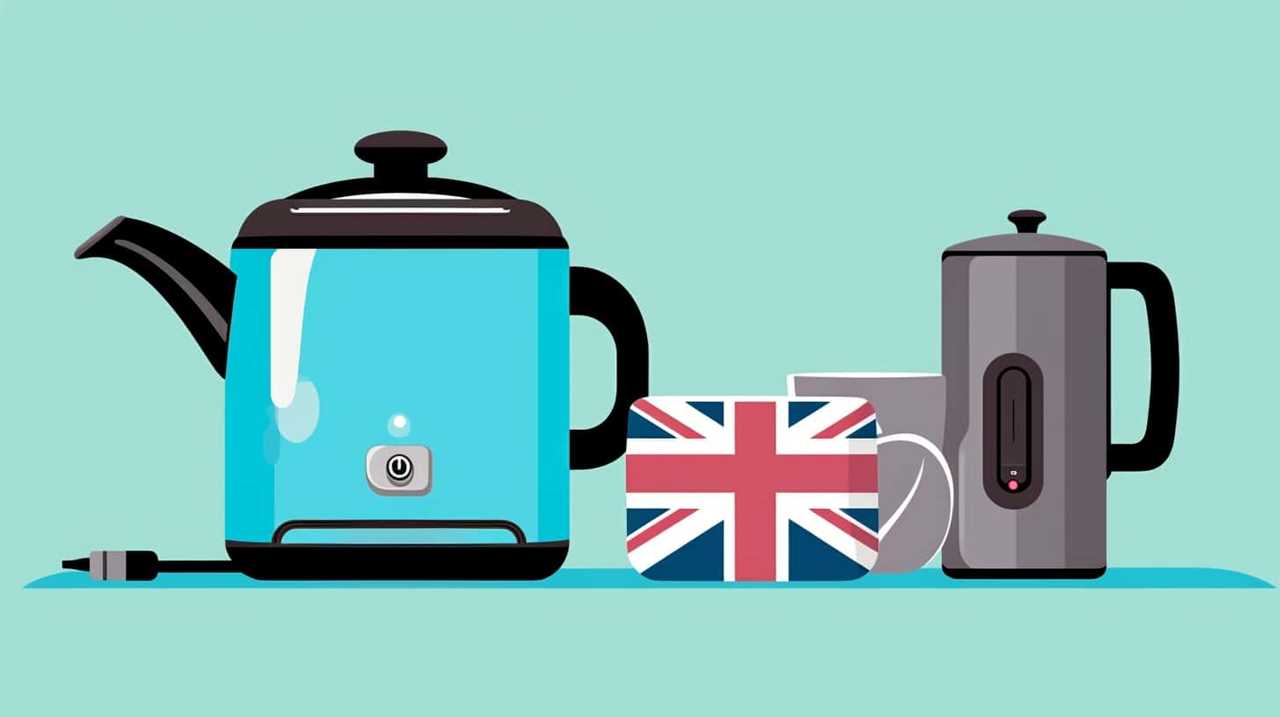
Efficiency of Gas Fireplaces
Gas fireplaces, while providing warmth and ambiance, can vary in efficiency depending on their design and maintenance. When considering the efficiency of gas fireplaces, it’s important to understand the benefits they offer. Here are some key points to consider:
- Energy savings: Gas fireplaces are more efficient than traditional wood-burning fireplaces, as they produce more heat with less fuel consumption.
- Convenience: Gas fireplaces are easy to use and require minimal maintenance compared to wood-burning fireplaces.
- Control: Gas fireplaces allow for precise temperature control, enabling users to adjust the heat output according to their preference.
- Safety: Gas fireplaces eliminate the need for handling and storing wood, reducing the risks associated with firewood storage and handling.
Understanding the efficiency and benefits of gas fireplaces is crucial for making informed decisions about home heating. However, it’s also important to consider the environmental impact of fireplaces, which will be discussed in the following section.
Environmental Impact of Fireplaces
One of the key factors to consider when evaluating the environmental impact of fireplaces is their contribution to air pollution. While fireplaces can create a cozy atmosphere and provide warmth, they also release pollutants into the air. Wood-burning fireplaces, in particular, emit fine particulate matter, carbon monoxide, and nitrogen oxides, which can have harmful effects on human health and the environment. These pollutants can contribute to respiratory problems, smog formation, and climate change.
However, it’s worth noting that modern fireplace designs have made significant advancements in reducing emissions. Additionally, there are alternative heating options available that offer environmental benefits, such as electric fireplaces or high-efficiency gas fireplaces. Transitioning to these alternatives can help reduce air pollution and minimize the environmental impact of fireplaces.

Now let’s explore the cost of operating fireplaces.
Cost of Operating Fireplaces
As we continue our exploration of fireplaces, it’s important to assess the cost of operating these appliances. When considering the cost, it’s crucial to take into account both the initial installation expenses and the long-term benefits of using a fireplace.
Here are some key points to consider:
- Cost of fireplace installation:
- The cost of installing a fireplace can vary depending on the type and complexity of the installation.
- Factors such as the type of fuel (wood, gas, electric) and the size of the fireplace can also affect the installation cost.
- Benefits of using a fireplace:
- Fireplaces can provide efficient heating, reducing the need for other heating sources and potentially lowering energy bills.
- They create a cozy and inviting ambiance, enhancing the overall comfort and aesthetic appeal of a home.
Pool Heaters
We use our pool heater frequently during the summer, and it’s one of the appliances that consume a significant amount of gas. Proper pool heater maintenance is essential to ensure its efficient operation and minimize gas usage.

Regular maintenance, such as cleaning the filters and checking for any leaks or malfunctions, can help optimize the heater’s performance and reduce gas consumption.
Another option to consider is installing a solar pool heater, which harnesses the sun’s energy to warm the pool water. Solar pool heaters are a more environmentally friendly and cost-effective alternative to traditional gas-powered heaters. They can significantly reduce gas consumption and provide long-term energy savings.
Outdoor Grills
Moving on from pool heaters, another appliance that consumes a significant amount of gas in our household is our outdoor grill, which we use frequently during the summer months.
Outdoor grills aren’t only a popular choice for cooking delicious meals, but they also require a constant supply of gas to fuel the flames. Here are some grilling techniques that can help optimize gas usage:

- Preheat the grill: Preheating helps to reduce cooking time, ensuring that less gas is used overall.
- Use direct heat: Cooking directly over the flame allows for faster and more efficient cooking, minimizing gas consumption.
- Keep the lid closed: By keeping the lid closed, you trap heat inside, resulting in quicker cooking times and reduced gas usage.
- Clean the grill: Regularly cleaning your grill ensures that it performs optimally, using gas more efficiently.
Frequently Asked Questions
Are Tankless Water Heaters More Gas-Efficient Than Traditional Water Heaters?
Tankless water heaters can be more gas-efficient than traditional water heaters. Compared to electric water heaters, they use natural gas to heat water on demand, resulting in lower energy consumption and cost savings.
Can I Use a Furnace to Heat My Swimming Pool?
Using a furnace to heat a swimming pool is possible, but there are more efficient alternatives. Heat pumps and solar heaters are better options, providing cost savings and environmental benefits.
How Much Gas Does a Gas-Powered Stove Consume While It’s Being Used?
Gas stoves have varying efficiency levels, with newer models being more efficient. On average, a gas stove consumes around 7,000 to 10,000 BTUs per hour. While gas stoves may have higher upfront costs compared to electric stoves, they are generally cheaper to operate in the long run due to lower energy costs.
What Are the Benefits of Using a Gas Dryer Instead of an Electric One?
Using a gas dryer instead of an electric one offers numerous benefits. It is cost-effective, providing significant savings on energy bills. Additionally, gas dryers are faster and more efficient, allowing for shorter drying times.
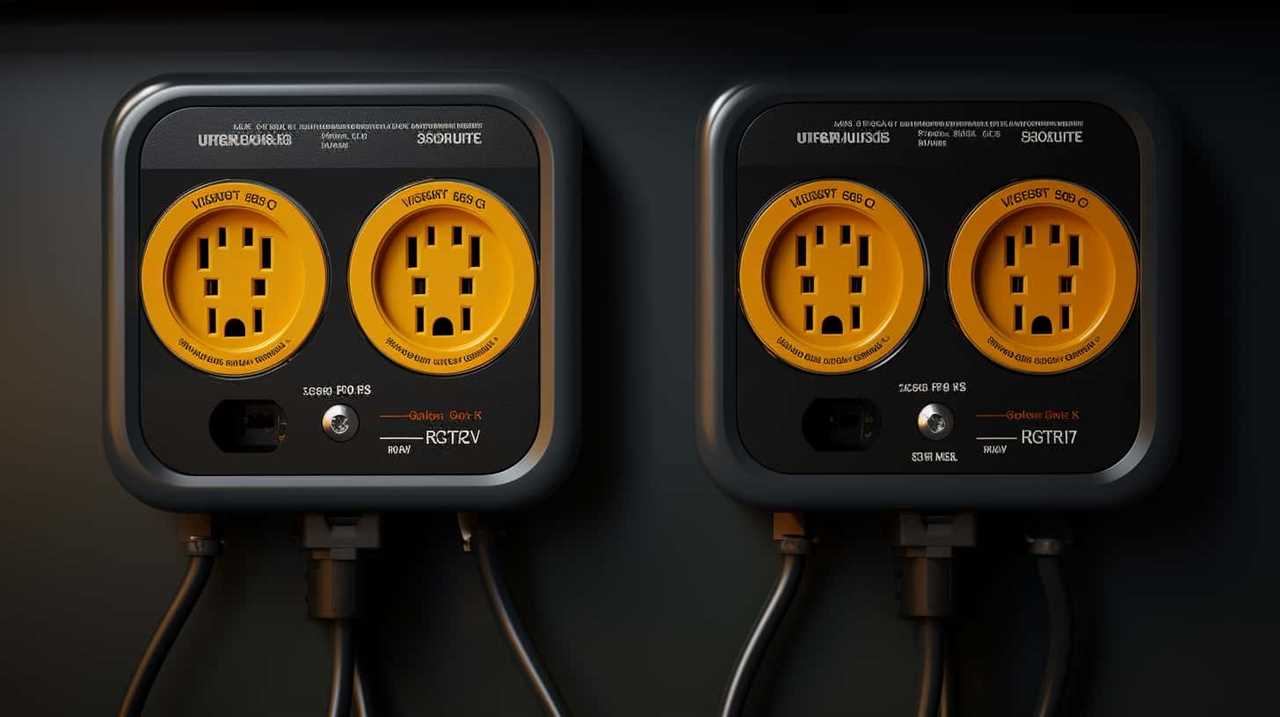
Do Outdoor Grills That Use Natural Gas Consume More Gas Than Those That Use Propane?
When comparing outdoor grill fuel efficiency, natural gas grills tend to consume less gas than propane grills. This is due to the higher energy content of natural gas, making it a more efficient fuel source.
Conclusion
In conclusion, water heaters, furnaces, stoves and ovens, dryers, fireplaces, pool heaters, and outdoor grills are the appliances that use the most gas.
These appliances play a significant role in our daily lives, providing warmth, comfort, and convenience.
It’s important to be aware of their gas consumption and take necessary steps to increase energy efficiency.

By understanding which appliances use the most gas, we can make informed choices to reduce our energy consumption and contribute to a more sustainable future.

